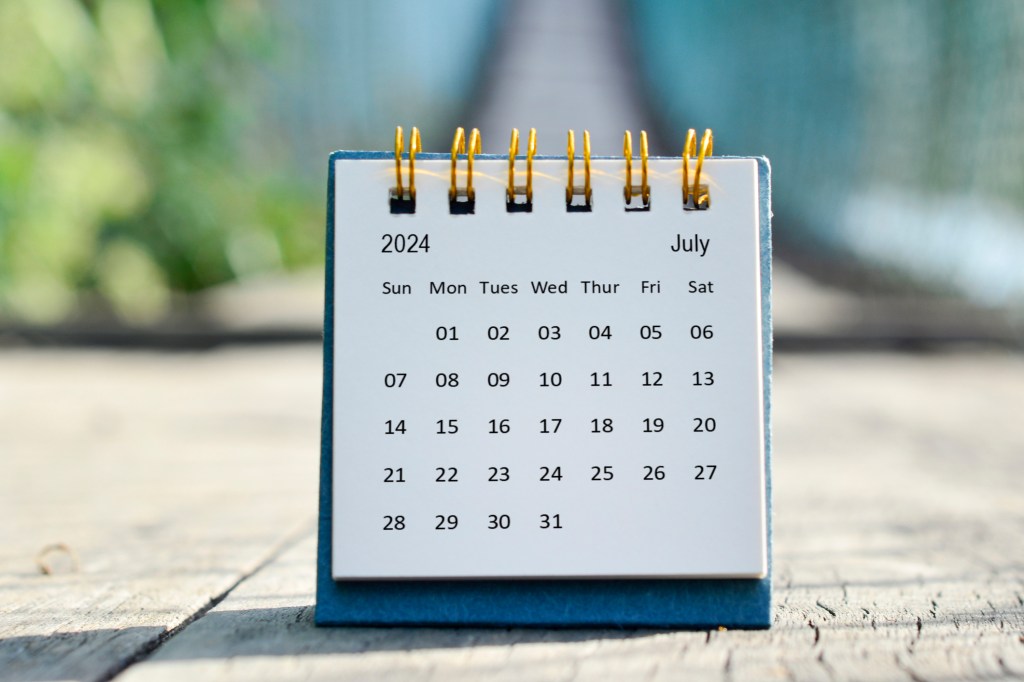It’s been six months since many of us passionately vowed to revamp our lives with positive new habits for 2024: eating more vegetables, saving more money, staying in better touch with loved ones.
We won’t pry as to whether you’re among the vast majority whose resolutions faltered and faded away or the impressive few who stuck to their guns, but we are here to offer a framework for going forward either way.
July is the perfect opportunity to reevaluate the goals you set back in January with a fresh set of eyes (not to mention the benefit of summer’s mood-boosting powers) — and determine which new ones it might behoove you to add.
Read on for four areas to consider when doing so.
Ask Yourself Why
According to licensed clinical psychologist Terri Bly, a great number of resolutions seem to revolve around the concept of “should.” (I should lose 15 pounds. I should read more.) But when we focus on fulfilling some perceived external mandate, we can lose sight of why a behavior may be beneficial to us in the first place.

“[We need to have an] understanding of … what is the thing I want for myself? How might I get that?” Bly told Verywell Mind. “That is going to be way better than a ‘should.’”
By homing in on why we’re aiming for a goal, we can better determine what other pathways could help us achieve it. If you feel you should learn a new language, asking yourself why might lead you to the realization that you want to feel more intellectually stimulated in day-to-day life. That in turn could help you realize that something less grandiose — like working on a crossword puzzle every day — might achieve the same results.
Are Your Goals Realistic?
Being better isn’t an all-or-nothing game. Maybe your goal of going to the gym four days a week didn’t pan out, but that doesn’t mean you should give up on an exercise habit entirely. Perhaps you just need to adjust your goal to be something more realistic.
“Where we go wrong with New Year’s resolutions is there’s this idea that it’s supposed to be some big, sweeping change, because that sounds kind of sexy,” Bly explained. “[But] as humans we’re not wired to make big, sweeping changes.”

Try setting small, attainable goals instead. Rather than the broad “I’m going to keep in better touch with my loved ones this year,” for instance, start by adding just one phone call with a friend or family member into your weekly schedule.
Learn How to Let Go
It’s also OK to let go of a goal that no longer makes sense or aligns with your vision for yourself, as keeping it may be doing more harm than good.
A 2022 study found that the more “frozen goals” a person had on their plate, in this case ones that were derailed due to the COVID-19 pandemic, the more likely they were to have experienced symptoms of stress, anxiety, and depression.
“When we think about well-being and success, we are so often focused on ways to increase goal commitment [and] increase goal engagement,” behavioral scientist Candice Hubley, a researcher on the study, told Fortune. “This work highlights an important and sometimes overlooked part of the story. It is also important to be able to disengage from goals, to know when to walk away.”

And going back to the importance of being realistic: Hubley and her colleagues also found that highly unattainable goals were more linked to anxiety and a higher risk of depressive symptoms.
“If a goal is truly unattainable, maintaining commitment is harmful because you are investing time [and] effort into something futile,” she explained. “These resources can be freed up by abandoning the goal and investing in other goals and pursuits. Holding onto unattainable goals likely increases self-doubts and sense of failure as well, contributing to the negative mental health outcomes.”
Build a Toolkit
Once you’ve established what you want to focus (or refocus) on, set yourself up for success by building a toolkit you can draw from. It can comprise physical objects and purchases — like a new bike, a blender for making green smoothies, and a comfy meditating pillow — as well as experts services, free resources, and family and friends. Basically, it should be “who or what is going to help [you],” said GQ wellness columnist Joe Holder.

Focus on creating one toolkit per one habit or goal, rather than a general life kit. For example, if you intend to start eating a Mediterranean diet (the health benefits of which are undeniable), your toolkit may include a cookbook, a meal-planning schedule you’ve created, and a buddy you can swap recipes with.











